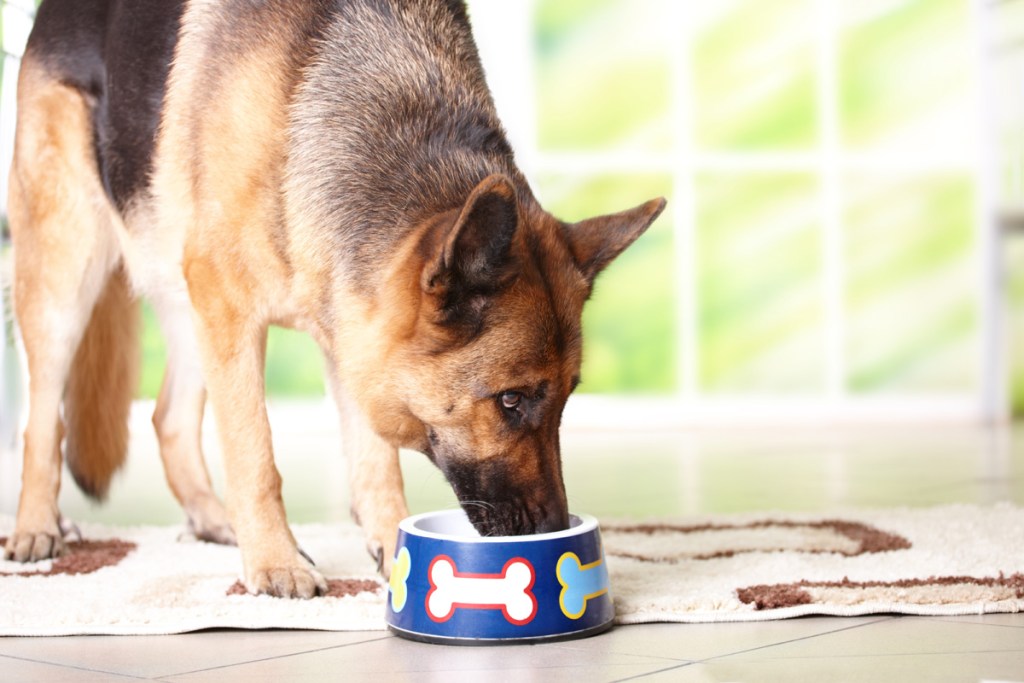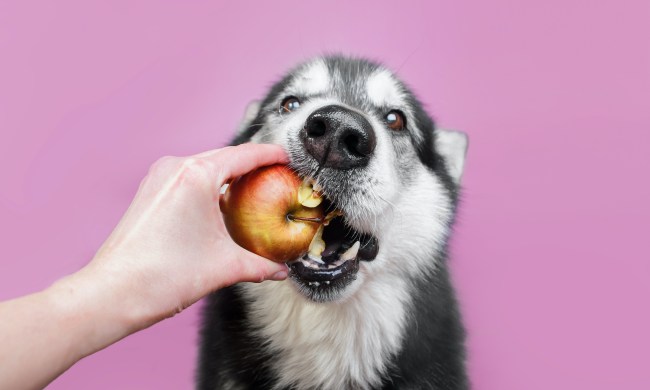Feeding a well-balanced diet is an important part of your German Shepherd’s overall healthcare. However, that doesn’t mean you have to break the bank by feeding food marketed as premium or super-premium. According to nutritionists at Tufts University’s Cummings Veterinary Medical Center, less expensive food that meets your dog’s nutritional needs is often a better option, provided it’s produced by companies with years of experience and knowledge in the pet food industry. These companies usually test their products more thoroughly, making them just as good as premium brands.

How much should a German Shepherd eat per day?
When determining how much to feed your German Shepherd you need to consider his age, size, and activity level. Puppies need to be fed a specially formulated puppy diet focused on growth. Adult dog diets should focus on maintaining a healthy weight. An adult male German Shepherd can weigh between 75 and 100 pounds, while a female can weigh between 55 and 70 pounds. Experts at Prudent Pet Insurance offer the following feeding guidelines for large breed dogs. Remember, though, this is just a general guide; it’s still a good idea to ask your veterinarian exactly how much you should feed your dog.
- 3 cups per day for dogs weighing 60 pounds
- 3 1/2 cups per day for dogs weighing 70 pounds
- 3 3/4 cups per day for dogs weighing 80 pounds
- 4 1/4 cups per day for dogs weighing 90 pounds
- 4 1/2 cups per day for dogs weighing 100 pounds
What can a German Shepherd not eat?
Many fruits and vegetables such as apples, blueberries, carrots, and broccoli can make healthy treats for your German Shepherd. However, you shouldn’t feed some types of people food to your pet, so it’s important to check with your veterinarian when in doubt.
According to the ASPCA Animal Poison Control Center, the following popular people foods are toxic to pets:
- Alcoholic beverages and food products containing alcohol can cause vomiting, diarrhea, decreased coordination, central nervous system depression, difficulty breathing, tremors, coma, and even death.
- Chocolate, coffee, and, caffeine all contain methylxanthines, which can cause vomiting and diarrhea, panting, excessive thirst and urination, hyperactivity, abnormal heart rhythm, tremors, seizures, and even death.
- Grapes and raisins can cause kidney failure.
- Almonds, pecans, and walnuts contain high amounts of oils and fats that can cause vomiting and diarrhea, and they can potentially cause pancreatitis.
- Onions, garlic, and chives can cause gastrointestinal irritation and can lead to red blood cell damage and anemia.
What dog food brands are affordable but healthy?
When shopping on a budget, steer clear of cheap, low-quality dog foods. According to an article in The Whole Dog Journal, these foods are made with the cheapest ingredients available in the pet food industry and are not healthy for dogs. Instead, look for an affordable high-quality, nutritionally balanced diet that will keep your dog happy and healthy. Of course, if your dog is on a prescription diet for health reasons, you will have to pay more for that food. Following are three top-rated foods manufactured by experienced pet food companies that have veterinary nutritionists on staff.
1. Purina ONE Natural Large Breed
Important benefits
- real chicken is the first ingredient
- four antioxidant sources promote your dog’s immune system
- doesn’t use artificial flavors or preservatives
2. IAMS Healthy Weight Large Breed Dogs
Important benefits
- chicken is the first ingredient
- includes glucosamine and chondroitin to help maintain bone and joint health
- contains L-carnitine to help support a healthy metabolism
3. Pedigree for Big Dogs Complete Nutrition
Important benefits
- contains glucosamine and chondroitin to promote joint and bone health
- contains omega-6 fatty acids to promote skin and coat health
- doesn’t contain high-fructose corn syrup, artificial flavors, or added sugar
What is the healthiest food for a German Shepherd puppy?
It’s important to choose specially formulated puppy food to support your young pup’s growth. Experts at the German Shepherd Dog Club of America advise looking for food that lists good protein, such as beef, chicken, or turkey, as the first ingredient. They also recommend avoiding foods that list chicken by-product meal, meat meal, or corn products as the main source of protein. Once you’ve narrowed down your options, seek advice from your veterinarian on which food will work best for your puppy.

Finally, according to a 2019 report by the Association for Pet Obesity Prevention, 56 percent of dogs in the US are overweight or obese. It’s a serious problem that can lead to a variety of health issues in dogs, including diabetes, osteoarthritis pain, and hypertension. Being a responsible pet parent means feeding your German Shepherd the appropriate amount of high-quality food for a well-balanced diet. When you do, you’ll have a happy, healthy dog eager to join his family on outdoor adventures.



